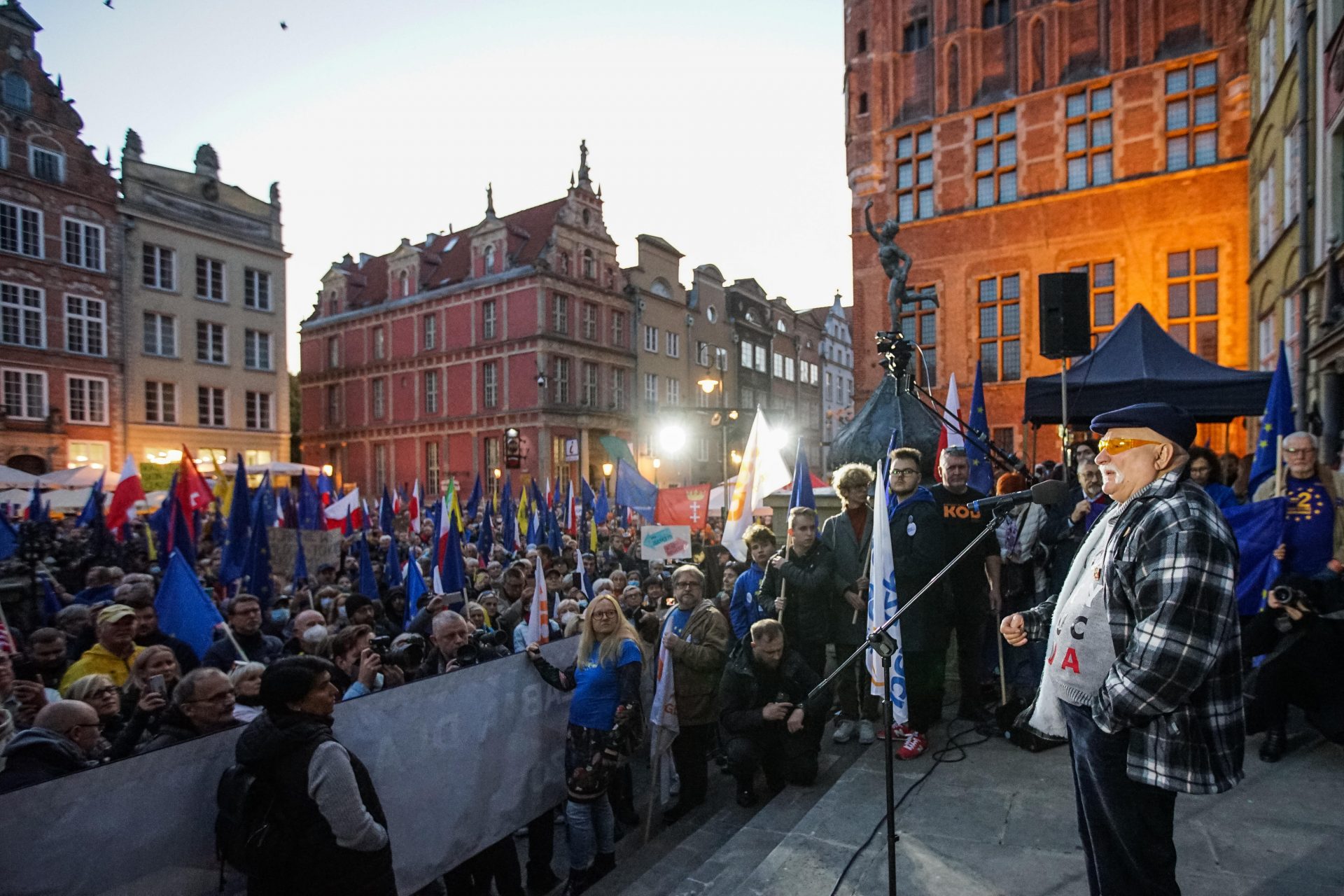The message was unequivocal. With chants and speeches and banners, the tens of thousands of protesters who poured out into the streets of Poland’s cities, proclaimed: “We are Europeans!” and “We are staying!”
Addressed by figures such as the legendary Solidarity leader Lech Walesa in Gdansk and former European Council chief Donald Tusk in Warsaw, the demonstrators called for an end to their populist government’s latest spat with the European Union, which they fear risk the country’s very membership of the bloc.
“We know why they want to leave (the EU)… so they can violate democratic rules with impunity,” Tusk told the crowd in front of the Royal Castle at a rally on Sunday.
Days earlier, Poland’s constitutional tribunal had ruled that key EU laws were “incompatible” with the country’s constitution. It was effectively rejecting the supremacy of EU law, a fundamental cornerstone of membership.
Worries that the government, led by the right wing populist Law and Justice Party (PiS), is engaged in a dangerous game that has gone too far brought up to 100,000 marchers into the streets of Warsaw alone.
But this is not just a catastrophe for Poland’s pro-Europeans. The threat to the EU itself is near-existential, and the limits of its potential response against breaches by rebel members exposes fundamental weaknesses that could set off an avalanche of rule-breaking and chaos.
“This is high-stakes stuff,” Catherine Barnard, professor of European law at Cambridge University and founder of UK in a Changing Europe, told me. “Because it’s the latest stage in the row with Poland, not the early skirmishes in a battle.”
The constitutional ruling – by a court stuffed with judges supportive of the government, in itself a source of dispute with the EU – comes on the heels of other rows with the European Commission over issues ranging from judicial independence and media freedom to women’s and LGBT rights.
While British Eurosceptics had a field day over the prospect of “Polexit”, European Commission president Ursula von der Leyen has vowed to use all the powers available to her, and EU politicians are incandescent. Supremacy of its law is central to the very existence of the EU.
“This situation is more than serious. I think that our Polish colleagues underestimate the negative and provocative signaling of their decision,” German Green MEP Sergey Lagodinsky said. “It is clear – if we have rule of law issues and they cannot be monitored by courts, we need action.”
Lagodinsky is worried the Commission will be too timid. But what it can actually do, and how effective this might be in bringing Poland into line, are questions that will be giving the EU leadership sleepless nights. Any sign of weakness or impotence could have catastrophic effects on the future of the bloc, but most of the measures that can practically be enacted are effectively, in Barnard’s words “toothless”.
One option would be to invoke the recently-created Article 7 in the EU treaty to hold accountable governments that threaten common EU principles of rule of law, human rights and democracy. This could lead to a suspension of Polish voting rights. In practice, though, this has proved a lengthy, cumbersome process and has already been invoked against both Poland and Hungary for earlier breaches without result. In any case, to trigger any sanctions under Article 7 would require unanimity, and Hungary, for one, won’t play ball.
Hungary’s prime minister Viktor Orbán has already given backing to his fellow right wing populists in the row. “The primacy of EU law can only apply in those areas where the EU has powers,” Orbán said, calling for member states’ sovereignty to be respected.
Most alternative responses concern money, or the lack of it. There have been calls for the Commission to launch an infringement procedure against Poland, which could result in fines. “But the Polish government simply will not pay, because it doesn’t recognise the EU’s jurisdiction here. And the EU has no police, no army, nothing to enforce this,” a senior political adviser with lengthy, high-level EU service told me. It’s no surprise to learn that Poland and Hungary have also been subject to past infringement procedures, with little effect.
More painful would be ‘conditionality’, which allows the suspension of payments to rebellious members breaching the rule of law. “It is not clear how the European Recovery Fund money can be distributed to a country that does not recognise European jurisdiction,” Lagodinsky argued.
Polish officials have already said that they don’t care and that the country has enough money. That’s up for dispute, but linking payments for Covid recovery or impoverished regions is sensitive and could backfire if it fuelled a feeling of victimisation among the more cantankerous states.
Such sanctions hurt people generally rather than governments, and alienating Poland’s overwhelmingly pro-European population – many of whom did not vote for the PiS – would be a spectacular own goal.
Poland’s ruling against EU legal jurisdiction isn’t the first, Barnard reminds me, with countries such as Denmark and others having long-running issues with European law – although none so serious as this latest. The German federal court in Karlsruhe effectively ruled in May last year that some EU laws were incompatible with Germany’s constitution. This was a niche financial decision about bonds and was a more nuanced judgement, but it provides populist fodder.
“It’s very easy for them to say if Germany can do it then so can we – this was a point made repeatedly at the time,” Barnard said.
The problem the EU has in enforcing its rulings is that the whole project is based on its members signing up to the central values and accepting the supremacy of EU laws. When a country no longer believes that, it can trigger Article 50 and leave, as the UK did. But when they object, rebel and stay, large, and unpredictable problems arise.
Poland’s prime minister Mateusz Morawiecki has said that Poland has no intention of leaving the EU, and there are no provisions to expel a country. In any case, expelling a member is a whole new level of jeopardy for a bloc that is struggling to find unity.
So, for Poland the risk is more reputational, and from the posturing of the government there it’s possible to conclude that it doesn’t care that much, especially under pressure from even more right wing politicians and ultra-conservative Catholics.
Yet there are pitfalls for Poland – from the practical to the geopolitical. The former could include the failure of the European Arrest Warrant if other countries don’t trust a state that doesn’t respect the rule of law and refuse to repatriate people on its wanted list. Politically, where does Poland, with a threatening Russia and Belarus on its borders, have to turn as an alternative ally?
At home, it’s hard to say how the crisis will play out for the government, says Dr Pawel Maranowski, of Collegium Civitas university, but the opposition is smelling blood. He pointed out that while around 35% of the people support the government, support for EU membership is above 70%, and Poles are very conscious of how much they have benefited from European financial support. “People trust outside institutions – the EU, the UN – more than the Polish government,” he said.
Maranowski says the latest wave of protests could build on mass women’s demonstrations last year against a strict abortion ban to put pressure on the government, which then might have to find a way to backpedal. The constitutional ruling is not binding until published officially.
Whoever triumphs in this battle – which at the moment looks more lose-lose than anything – the Polish and Hungarian rebellions underline a need for the EU to look at itself.
“This is part of a wider problem that the union has in the sense that it has become much more political and intrusive – consensually so – and clearly that is producing tensions,” the EU adviser remarked. Even committed Europeans like Michel Barnier, who wants to run for president in France, have started to talk about recovering national sovereignty on issues such as refugees and migration.
The need to find an answer to that wider problem is becoming increasingly pressing for Europe. Without one, the bloc faces a very uncertain future.




